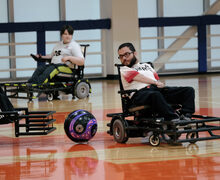Colorado’s Phillip Lindsay relies on family, football, to enact the change he wants to see
Courtesy of Colorado Athletics
Phillip Lindsay keeps #FamilyFirst and uses football to be a social leader.
Last December at a pregame luncheon, one day before Phillip Lindsay led the resurgent Colorado Buffaloes to the Valero Alamo Bowl, a reporter asked him a question: What will he do when his football career ends?
Lindsay grew up in Aurora, Colorado, a neighborhood where “not a lot of good goes on.” Troy and Diane, his parents, struggled to provide for Lindsay and his four siblings. Five years ago, a burglar broke into his home and beat Rambo, his dog. Lindsay has seen tragedy and wants to create change. So, when asked the question, he didn’t hesitate and said he would eventually trade in his shoulder pads for a police officer’s badge.
“There’s a lot of people that are doing the wrong things,” Lindsay said. “A lot of people do good, but the bad gets more publicity right now. We need to know that there’s good stuff going on too.”
His sense of community comes from his family; tattooed above his heart, Lindsay has the phrase “Family First.” In his family, the women get this inscribed on their ankles and the men above their hearts. Troy, who coached him and his brothers until high school, is Lindsay’s role model. He taught his son the importance of giving back even when there wasn’t much to give.
His mother, Diane, taught him how to fight as she battled a muscle disease. They are why he plays football for Colorado (4-4, 1-4 Pac-12) and has tallied up 1,093 rushing yards, the sixth-highest total in the nation. They have instilled in Lindsay that football is a platform to better the world around him.
“I don’t want to represent the community because of football or because of my name,” Troy remembered his son telling him. “’I just want to help.’”
Represent for your Family and your State! Be proud of who you are!???? #FamilyFirst #Represent #CO pic.twitter.com/s7dOE1Xdac
— Phillip Lindsay (@I_CU_boy) October 3, 2017
Lindsay and his four siblings — Sparkle, Cheri, Zach and Marcus — hardly went to friends’ houses. They bonded as they played in and around the family’s four-bedroom home. As children, Lindsay routinely wrestled his younger brothers before his two older sisters leveled the field. Their competitive nature lent itself to sports. As they approached high school, they realized the importance of scholarships. Troy, who drove a city bus, and Diane, who was a psychotherapist, made it clear to their children that they couldn’t afford college.
“College wasn’t an option,” Troy said. “We stressed you can either work and pay your way through it or take the sports route. All of them had confidence. It was a matter of pulling it out of them.”
When Lindsay’s eldest sister Sparkle earned a basketball scholarship from Colorado Mesa University, the rest hurried to follow her lead. Cheri received a volleyball scholarship to Prairie View A&M. Zach went to North Colorado for football. Lindsay, meanwhile, was offered a scholarship from Colorado as he pursued the Denver Public Schools career-rushing record that had stood for 33 years. The name at the top of the list read Troy Lindsay, who had run for 4,400 yards.
“I’m going to break my pop’s record,” Lindsay, who then wore number 22 for his father, said in 2013. “I’m going to make him proud.”
Lindsay wanted his parents in the stands for that game, he always said that he had “an extra boost” when they were watching him live. In the first game of his senior year, Lindsay eclipsed his father’s record and also tore his left ACL after making a quick cut. His season was over, his career in doubt.
In rehab, Lindsay was motivated by Diane. As he rehabbed, her muscle disease worsened. Her hair fell out. Her feet felt numb. Calcium deposits restricted her ability to walk.
Colorado honored its commitment and Lindsay redshirted his freshman year. In practice, a 165-pound Lindsay needed to be restrained from fighting offensive lineman, and he earned him the nickname “The Tasmanian Devil.”
In 2015, Lindsay started six of the team’s 13 games and embraced his increased public visibility. He started going to elementary schools and talking to children. He knew how important his parents were in his development and wanted to be a role model. He went to local schools in Denver, Aurora and Boulder and preached the importance of grades and giving back to others.
“Kids need to know that they are loved,” Lindsay said. “They need to know that someone is there for them. When they are doing something wrong, they need to know that too.”
.@I_CU_boy surprised a few young Buff fans as they were checking out the new facilities in the Champions Center today! pic.twitter.com/Fvaf335ec2
— Colorado Football (@RunRalphieRun) October 19, 2017
Lindsay’s star power grew last year when Colorado rose to national prominence behind his 1,252 rushing yards. Still, Diane had a staphylococcus infection and couldn’t attend any of his games. On Nov. 26, 2016, then-No. 9 Colorado was one win away from clinching the Pac-12 South crown.
The Lindsays don’t have the money to travel to away games, so it was the last game Diane could have seen in person. Troy went down to the field before kickoff and checked in with his son. He then turned around and pointed to Diane, who sat in the stands. As the Buffaloes celebrated an eventual 27-22 victory, Lindsay broke out a wide smile and embraced his mother in the stands.
“I believe in the right things,” Lindsay said. “Anytime I have a decision, it’s based on what my parents would do … Times got hard. At the hardest times, your true character shows. I remember them buckling down and not showing that everything was wrong.”
Published on October 26, 2017 at 12:40 pm
Contact Nick: [email protected] | @nick_a_alvarez




